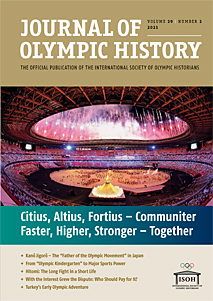 At this moment, as I write these words, the Games of the XXXII Olympiad in Tokyo – postponed by a year – are officially being opened. The Japanese hosts, forced by the COVID-19 pandemic to adjust their plans to constantly changing conditions, have done a great amount. Most importantly, they have promised safe Games, which will be held under a new Olympic motto that sees the addition of solidarity: Citius, Altius, Fortius – Communiter, or in English: “Faster, Higher, Stronger – Together”.
At this moment, as I write these words, the Games of the XXXII Olympiad in Tokyo – postponed by a year – are officially being opened. The Japanese hosts, forced by the COVID-19 pandemic to adjust their plans to constantly changing conditions, have done a great amount. Most importantly, they have promised safe Games, which will be held under a new Olympic motto that sees the addition of solidarity: Citius, Altius, Fortius – Communiter, or in English: “Faster, Higher, Stronger – Together”.
The best reward imaginable is the 11,000 athletes from 206 teams – who have had to show great patience and willpower to qualify for these Games – being able to compete. Many things will be different this time around. Without spectators, the atmosphere of previous Games will be absent. There are many restrictions for the
participants. The focus will be less on the festivities and more on the sport itself.
As has been the case for more than half a century, billions of people around the world will have the opportunity to follow the medal hunt on their screens. The long road that had to be travelled to reach this level is revealed in this issue in Part 3 of our feature on Olympic television history, where Richard W. Pound turns his attention to the 1976 Games.
Those who do not know the past are unable to understand the present and cannot envision the future. The other articles in this issue, which are primarily devoted to Japan’s Olympic history, were also selected under this motto. In the beginning there was Jigoro Kano, the “Father of Judo”, whom Andreas Niehaus writes about with great insight. My pieces commemorate Japan’s first medallists: triple jumper Mikio Oda, who won the first gold medal; Kinue Hitomi, who was the first woman to win a medal; and swimmer Hideko Maehata, the first female Olympic champion.
David Wallechinsky continues his articles on Olympic film history. This time, his focus turns to the Tokyo Paralympics in 1964. This piece is also intended as a preview of the upcoming Paralympic Games, which will begin on 24 August 2021 at the same location. Before statisticians are overwhelmed by another flood of results, Bill Mallon and Hilary Evans present corrected medal tables of the Summer Games from 2004 to 2016 – proof (and maybe even a reminder) that cheating does not pay off in the long run.
Tolga Şinoforoğlu went out in search of the roots of Olympic history in the late Ottoman Empire – and found what he was looking for. In Part 1, he looks at the Games from 1896 to 1906, during which Turkey was still officially absent. All of that changes in Part 2, coming up in the next issue.
Our series on the biographies of all IOC Members is now at instalment 36. There are also several obituaries where we remember famous athletes. A number of them passed away as a result of the COVID-19 pandemic.
– Volker Kluge, Editor
Members of ISOH may view digital versions of all issues by clicking here.

There are no comments published yet.